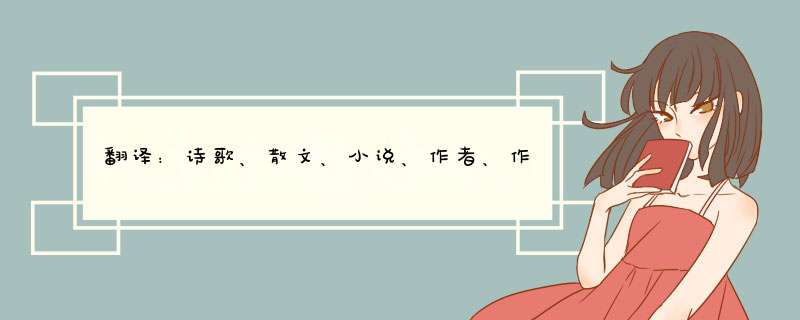
诗歌:poetry;散文: prose;小说: fiction;作者: authors;作品: works,;现实主义:realism;浪漫主义: romanticism;文学: literary;艺术:art。
浪漫主义是文艺的基本创作方法之一,与现实主义同为文学艺术上的两大主要思潮。作为创作方法,浪漫主义在反映客观现实上侧重从主观内心世界出发,抒发对理想世界的热烈追求,常用热情奔放的语言、瑰丽的想象和夸张的手法来塑造形象。浪漫主义的创作倾向由来已久,早在人类的文学艺术处于口头创作时期,一些作品就不同程度地带有浪漫主义的因素和特色。但这时的浪漫主义既未形成思潮,又不是自觉为人们掌握的创作方法。
Romantism is one of fundamental literature and art formula for creation, with actualism and for that literature and art is upper two big main trends of thought Put particular emphasis on the secondary subjective self's inner world as formula for creation , romantism on reflecting objective reality starting off, enthusiasm expressing to the ideal world runs after, come to mold an image language overflowing with enthusiasm , magnificent imagination and exaggerated gimmick in common use The romantism creation inclination is as old as the hills, as far back as human being's literature and art is in an oral creating a period, a little work the zone factor and characteristic having romantism right away to varying degrees Now that but romantism at this time not having formed a trend of thought, formula for creation being not that conscientious conduct grasps
浪漫主义是文艺的基本创作方法之一,与现实主义同为文学艺术上的两大主要思潮。
The romanticism that is one of the foundational creation in literature which is the same with the realism are the two leading trends of thought in cultural and aritistic fields
The romanticism that is one of the foundational creation in literature which is the same with the realism are the two leading trends of thought in cultural and aritistic fields
清教主义 Puritanism
浪漫主义 Romanticism
Romanticism was a movement in literature, philosophy, music and art which developed in Europe in the late 18th and early 19th centuries Starting from the ideas of Rousseau in France and from the Storm and Stress movement (狂飙运动) in Germany Romanticism emphasized individual values and aspirations (灵感) above those of society As a reaction (反应) to the industrial revolution (工业革命), it looked to (承上启下) the Middle Ages and to direct contact with nature (与大自然的直接接触) for inspiration (灵感)。 Romanticism gave impetus (动力支持) to the national liberation movement (民族解放运动) in 19th century Europe
启蒙运动 Enlightenment Movement
Enlightement was an intellectual (知识分子) movement originating in France, which attracted (吸引) widespread (普遍的) support (支持) among the ruling (统治阶级) and intellectural classes of Europe and North America in the second half of the 18th century It characterizes the efforts (作用) by certain European writers to use critical reason (批评推理) to free minds from prejudice (偏见), unexamined authority (权威) and oppression (压迫) by Church or State (国家政权)。 Therefore the Enlightenment is sometimes called the Age of Reason (理智的年代)。
浪漫 [làng màn] [浪漫]基本解释
1富有诗意,充满幻想
2行为放荡,不拘小节(常指男女关系而言)
[浪漫]详细解释纵情,任意。
宋 苏轼 《与孟震同游常州僧舍》诗之一:“年来转觉此生浮,又作三 吴 浪漫游。” 宋 曾巩 《送郭秀才》诗:“当今文人密如栉,子勿浪漫西与东。”
犹烂漫。
宋 张镃 《过湖至郭氏庵》诗:“山色棱层出,荷花浪漫开。”
富有诗意,充满幻想。
鲁迅 《二心集·对于左翼作家联盟的意见》:“革命尤其是现实的事,需要各种卑贱的,麻烦的工作,决不如诗人所想像的那般浪漫。” 老舍 《二马》第五段二:“你老说我太注重事实吗,我得学着浪漫一点,是不是?” 冰心 《寄小读者》二十:“轻柔的笑声,从水面,从晚风中传来,非常的浪漫而潇洒。”
引申指风流,不拘小节(多指男女关系而言)。
曹禺 《日出》第二幕:“你真是个杰作!又香艳,又美丽,又浪漫,又肉感。”《花城》1981年第6期:“不过是一个浪漫轻浮而又不负责任的异国女郎,能够及时地摆脱正是自己的幸运。”
指 唐 元结 。
清 沉树本 《大水叹》诗之五:“长歌《舂陵行》,千载思 浪漫 。”原注:“ 元结 称 浪叟 ,亦称 漫叟 。《舂陵行》, 元结 忧民诗也。”参见“ 浪翁 ”。
[浪漫]百科解释浪漫是指为所爱的人或物达到感动,开心等正面意义,并且能被记住一段时间或更久的一个人或者多人所做的行为或语言。称为浪漫。浪漫,意为纵情;浪漫;富有诗意,充满幻想;不拘小节(常指同性或异性情侣关系而言)。此词来自于西方词语Romantic音译的演变而成,其作用就是为了翻译Romantic。至于说出自宋·苏轼《与孟震同游常州僧舍》诗之一:“年来转觉此生浮,又作三吴浪漫游。”中的“浪漫”二字,并不是一个词语,而是两个并列字,诗中此二字的意义与现在浪漫一词的意思不同。 更多→ 浪漫
[浪漫]英文翻译romantic
[浪漫]反义词 现实 [浪漫]相关词语 感伤 汗漫 约会 现实 纵脱 恬淡 狂放 意境 伤感 文字 放荡 烂漫 [浪漫]相关搜寻 浪漫主义 浪漫的反义词是什么 革命浪漫主义 浪漫谛克
欢迎分享,转载请注明来源:浪漫分享网

 微信扫一扫
微信扫一扫
 支付宝扫一扫
支付宝扫一扫
评论列表(0条)